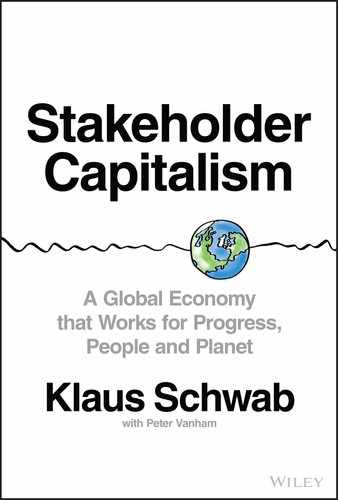Reimagining our global economy so it becomes more sustainable and prosperous for all Our global economic system is broken. But we can replace the current picture of global upheaval, unsustainability, and uncertainty with one of an economy that works for all people, and the planet. First, we must eliminate rising income inequality within societies where productivity and wage growth has slowed. Second, we must reduce the dampening effect of monopoly market power wielded by large corporations on innovation and productivity gains. And finally, the short-sighted exploitation of natural resources that is corroding the environment and affecting the lives of many for the worse must end. The debate over the causes of the broken economy—laissez-faire government, poorly managed globalization, the rise of technology in favor of the few, or yet another reason—is wide open. Stakeholder Capitalism: A Global Economy that Works for Progress, People and Planet argues convincingly that if we don't start with recognizing the true shape of our problems, our current system will continue to fail us. To help us see our challenges more clearly, Schwab—the Founder and Executive Chairman of the World Economic Forum—looks for the real causes of our system's shortcomings, and for solutions in best practices from around the world in places as diverse as China, Denmark, Ethiopia, Germany, Indonesia, New Zealand, and Singapore. And in doing so, Schwab finds emerging examples of new ways of doing things that provide grounds for hope, including: By accurately describing our real situation, Stakeholder Capitalism is able to pinpoint achievable ways to deal with our problems. Chapter by chapter, Professor Schwab shows us that there are ways for everyone at all levels of society to reshape the broken pieces of the global economy and—country by country, company by company, and citizen by citizen—glue them back together in a way that benefits us all.
Table of Contents
- Cover
- Title Page
- Copyright Page
- Dedication
- About the Authors
- Preface
- PART I: THE WORLD I GREW UP IN
- 1 75 Years of Global Growth and Development
- Foundations of the Post-War Global Economic Order
- Notes
- 2 Kuznets’ Curse
- The Original Kuznets’ Curse: GDP as Measure of Progress
- The Second Kuznets’ Curse: Inequality
- The Third Kuznets Curse: The Environment
- Notes
- 3 The Rise of Asia
- China's Special Economic Zones
- The Bigger Picture
- Notes
- 4 Divided Societies
- German Division and Reunification
- The Erosion of the Political Center
- Societal Unrest
- The Lesson to Draw from a Divided Society
- Notes
- PART II: DRIVERS OF PROGRESS AND PROBLEMS
- 5 Globalization
- Indonesia and Globalization
- Early Beginnings and Spice Routes6
- Notes
- 6 Technology
- A Changing Labor Market
- A Changing Business Landscape
- Pre-Industrial Revolutions
- The First Industrial Revolution
- The Second Industrial Revolution
- The Third Industrial Revolution
- The Fourth Industrial Revolution
- Notes
- 7 People and the Planet
- Thunberg at Davos
- Notes
- PART III: STAKEHOLDER CAPITALISM
- 8 Concept
- The History of the Stakeholder Concept
- The Stakeholder Model Today
- Principles and Beliefs Underlying the Stakeholder Model
- Stakeholder Capitalism in Practice
- Notes
- 9 Companies
- Mærsk
- Notes
- 10 Communities
- New Zealand during the COVID-19 Crisis
- The Key Tasks of National Governments
- Singapore as a Model of Stakeholder Government
- New Zealand and the Move Away from GDP
- Civil Society and the International Community
- Notes
- Conclusion: The Road to Stakeholder Capitalism
- Acknowledgments
- Index
- End User License Agreement
